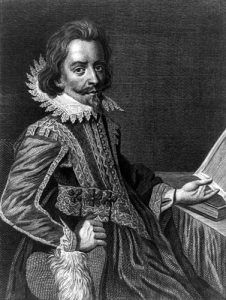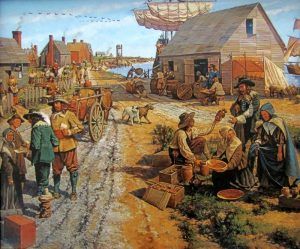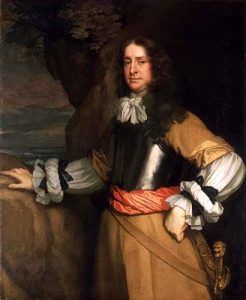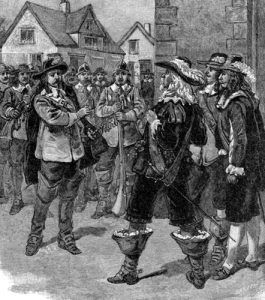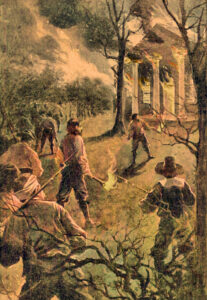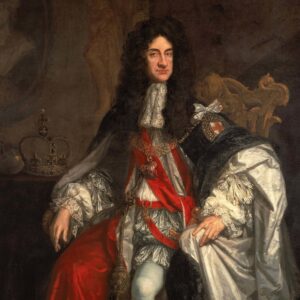Nathaniel Bacon was an English merchant adventurer who emigrated to the Virginia Colony, where he sat on the Governor’s Council but later led Bacon’s Rebellion. The Rebellion was briefly successful, but the rebel forces collapsed after Bacon’s death from dysentery.
Nathaniel Bacon was born on January 2, 1647, in Friston Hall in Suffolk, England, to influential landowner parents Thomas Bacon and his wife Elizabeth, the daughter of Sir Robert Brooke of Cockfield Hall, Yoxford. He was his father’s only son and had one full sister and a half-sister by his father’s second wife Martha Reade. His natural mother died in 1649 when he was two years old. He was educated at the University of Cambridge, where he was admitted as a Fellow-Commoner at St Catharine’s College in 1661. As a young man, he traveled around Europe, including Germany, Italy, Switzerland, France, and the Netherlands, in 1663-1664 with the celebrated naturalist John Ray and fellow pupils Francis Willughby and Philip Skippon. He returned home at the end of April 1664 and was admitted to study law at Gray’s Inn in November 1664.
Nathaniel married Elizabeth Duke, the daughter of Sir Edward Duke of Benhall and his wife Ellenor Panton, reputedly in direct defiance of her father’s veto. After accusations that Nathaniel had cheated another young man of his inheritance, Thomas Bacon gave his son the considerable sum of £1,800, and the young man sailed into exile across the Atlantic. Since his cousin and namesake Nathaniel Bacon was a prominent colonial leader and friend of Governor William Berkeley, Bacon initially settled in Jamestown, Virginia, where he bought two frontier plantations on the James River. By 1675, Bacon was appointed to the governor’s council.
The year 1676 was a severe one for the people in the young colony of Jamestown. Their Governor, Sir William Berkeley, was a cruel, selfish man. He ruled the colony entirely in his own interests, keeping his subjects in deep poverty by unjust taxes and wresting a significant, illegal profit from the fur trade with the Indians. The Legislature, or Governor’s Council, was composed of his friends; thus, the people had no recourse. The Indians began to attack the settlers along the frontier to add to their troubles. Their fields were laid waste, their servants killed, and their stock was driven off and slaughtered, but the Governor would not lift a hand to protect them, not wanting to lose his profitable fur trade.
Also occurring in 1676 was King Philip’s War in New England, and reports of the horrible massacres were continually reaching Virginia. The Susquehannock Indians and other tribes were finally aroused to a dangerous pitch, and many of the people along the frontier were put to death.
Still, the Governor refused to do anything to protect the settlers. At last, they took matters into their own hands and formed a company of about 300 men, but Governor Berkeley refused to commission anyone to take command of the troops or allow them to go against the Indians.
At that time, young lawyer Nathaniel Bacon, a man of wealth and education, had purchased a large plantation about 26 miles below Richmond, not far from the Indian frontier. Having himself met with heavy losses at the hands of the Indians, he went to Governor Berkeley and begged to be allowed to lead the troops. But, the Governor would not consent, saying that it was best not to excite the Indians further and that their outbreak would soon cease.
Bacon and the rest of the colonists, however, knew better. In despair, the colonists asked Bacon to defy the Governor. But, at first, he was not willing to do this. Later, though, he visited the camp of the volunteers, who unanimously begged him to become their leader. Under their enthusiasm, he accepted the command, and the small army immediately set out for the Indian encampments along the Roanoke River.
Governor Berkeley was furious when he found out and organized a party of friends who started after Bacon, declaring that he would hang him for going to war without orders. But, the British party could not find him, for Bacon and his volunteers were amid a skirmish with the Indians, and Berkeley and his followers dared not venture into the fray. When the Governor got back to Jamestown, he was met by colonists from the lower coast settlements. They told him they supported Bacon and demanded that a new Legislature be chosen to represent the people. Berkeley was frightened, seeing that he would have to yield in appearance at least, and promised that a new Legislature would be called at once.
In the meantime, Bacon and the other volunteers had routed the Indians and soon came marching home. For the present, they felt that the colony was safe. Bacon’s enthusiastic friends elected him a member of the Legislature, and when the time came for him to take his seat, 40 of them went down to Jamestown with him in a sloop. The Governor knew of their coming and managed to capture the sloop with the help of two boats and a ship. But, when Bacon reached Jamestown, Berkeley dared not take the revenge he had planned. The angry people were up in arms for their leader, and he was forced to let the young man take his place in the Legislature.
However, that very night, Bacon was warned that a warrant was out to seize him the next day and that the roads and rivers were guarded to prevent his escape. But, Nathaniel Bacon was not a man to be taken easily. He mounted a horse and rode away across the country in the darkness until he had put many miles between himself and his enemies and had reached the home of friends and safety.
In the morning, when the Governor’s men went to drag Bacon from the house where he had stayed, they were astonished and chagrined to find him gone. While they angrily searched for him, Bacon’s friends gathered in a mob — 500 strong — vowing to kill the Governor and all his friends. A guard was hastily dispatched for Bacon, and he hurried back to Jamestown to control the angry frontiersmen. Berkeley now found himself in the position where he had hoped to force Bacon. Instead, the colonists forced the governor to sign a commission appointing Bacon as a Major-General. Later, Bacon also got the Legislature to pass laws to relieve people’s suffering. These laws were known as “Bacon’s Laws” and stood as a monument to the young hero long after he had passed away. On July 30, 1676, Bacon and his men issued the “Declaration of the People of Virginia,” criticizing Berkely’s administration in detail, accusing him of levying unfair taxes, appointing friends to high positions, and failing to protect settlers from Indian attacks.
While Bacon and his friends wrestled with the Governor and the Legislature, the Indians sneaked down upon a little village about 20 miles north of Jamestown and murdered the people in cold blood. General Bacon set out for the Indian country. Just as he was leaving the last town on the frontier, a messenger came riding up, saying the Governor was raising troops, intending to capture Bacon on his return. The General promptly turned his army and started a quick march for Jamestown.
But, he need not have troubled himself. When the militia found they had been called out to capture Bacon instead of to fight Indians, they unanimously turned and left the field. The old governor fainted with anger and mortification and was forced to flee across the Chesapeake Bay for safety.
Upon his arrival, Bacon took charge of the government at the people’s desire. He was now between two enemies. The Indians, however, seemed the most insistent. For the moment his back was turned, they had again rushed down upon the unprotected people along the frontier. He, therefore, set out at once for their relief. For many days, the General and his valiant band fought and pursued the Indians. Then they turned homeward, confident that the Indians had tasted enough battle to satisfy their war appetite for many months.
When they reached the frontier settlements again, they learned that Governor Berkeley somehow managed to get possession of Jamestown again.
When he learned of the governor’s action, Bacon had already disbanded his men, and all but 136 of them had set out for their homes. However, the remnant of his army, footsore and hungry as they were, were more than willing to attack Berkeley, whom all regarded as a common enemy.
“On to Jamestown!” was the cry from the men. They set out quickly and pushed onward with such untiring vigor that they were rounding the narrow neck of sand that connected Jamestown with the mainland before the Governor heard of their intentions.
Under cover of the silence and darkness of night, Bacon and his men threw up entrenchments about the town and shut in the Governor and his people. In the meantime, Bacon’s army was quickly being increased daily by fresh recruits as men from all over the colony flocked to his aid. They were determined to subdue the governor and force him to recognize the rights of the people. Finally, Berkeley and his men slipped away down the bay in their vessels, and Bacon let them go. But, he resolved to make it impossible for the governor ever again to find a harbor in Jamestown. He ordered the town to be burned to the ground on September 19, 1676.
Nearly all of the colony of Virginia was now in open rebellion. The people warmly seconded the efforts of their brave General Bacon, and an effort was made to restore the shattered government to order. A new Legislature was formed, with Bacon at its head, but amid his successes, Bacon sickened and died from dysentery on October 26, 1676.
It was a bitter blow to the people, who knew no one in the colony could take his place. They also knew that Berkeley would soon get control again and that matters would be even worse than before. They were right, and Governor Berkeley soon returned to power, seizing the property of several rebels, hanging 23 men, and imprisoning dozens of others.
A cry of horror and protest rose from the colonists that was so “loud” it reached the King’s ears. Before long, an investigative committee returned its report to King Charles II; Berkeley was relieved of the governorship and returned to England.
“That old fool has put to death more people in that naked country than I did here for the murder of my father.”
— King Charles II
But, Nathaniel Bacon and his friends — who instituted the first “Great Rebellion” in America and who gave up their lives just 100 years before the American Revolution — did not die in vain. The Governors who succeeded Berkeley, mindful of these men, were careful not to oppress the people too much lest another Bacon rise to right their wrongs.
Compiled by Kathy Alexander/Legends of America, updated February 2024.
Mostly written by I.N. Canfield in 1913, with updates from Wikipedia. Compiled and edited by Kathy Alexander/Legends of America, updated February 2024.
Also See:
Jamestown – First Successful English Settlement
Heroes and Patriots of America
Settling of America – The Old Dominion
Sources:
McFee, Inez Nellie Canfield; American Heroes from History, Chicago, A. Flanagan company, Chicago, 1913.
Wikipedia

